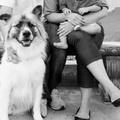I am going to name my future unborn child Tojo Sakai. My first generation mom thinks it’s not only stupid but a bad idea. Of course, this is the same parent who told me that I shouldn’t try to grow a mullet. Obviously, she’s an unreliable advice giver and possibly criminally insane.
An informal poll of my friends tells me that they don’t care if I named my kid Hitler. “It’s your kid,” one of them told me, “You can do anything you want. It’s not like you’re going to name my children.” I beg to differ. I would like a say in the naming of their children. I have so many good ones already picked out; it would be a shame not to use them on their offspring. Let’s see, I like Tupac (like the rapper) and Kazuo if it’s a boy, and Skyy (like the vodka) and Kaori if it’s a girl. And a part of me thinks there should be a Koji Junior. Would it be too unusual to name a friend’s kid after me? I don’t think so.
Tojo is a strong name. He was the Harvard educated military dictator of Japan who was the main architect of the attack on Pearl Harbor and the war against the United States. What father wouldn’t want their kid to be a Harvard educated military dictator people write about in history books? It’s better than being unemployed, living at home and celebrating his 30th birthday with me, right?
This means however that Tojo probably won’t be able to visit any Asian country other than Japan, for obvious reasons. Also, there’s a chance that he will be made fun of at school. Tojo isn’t common like Tom or Mike. The following is a list of the different names he could be called by his classmates (in no particular order): dojo, hobo, mojo, toe jam, camel toe, toe hoe. Well, the list can go on forever.
I feel for young Tojo already. I really should give him a “normal” American name. As a person with an “ethnic” name myself, I know first hand how it feels to be “different.” The most common thing I get now is that Koji is very atypical but still cute. I’m not going to lie and say that I had a horrible experience with my name when I was in school. I don’t think anyone has ever made fun of me to my face—probably because I would have hit them in the face if they did. Maybe I need to teach young Tojo how to fight.
And yet, when I first got to college I wanted to be Steven (my middle name) instead of Koji. I told everyone I met that my name was Steven. That lasted for about a day. The idea behind the name change was that since I wanted to eventually become the President of the United States, I figured that middle America would more likely vote for a Steven rather than a Koji. It took the rest of college and a whole bunch of political sciences courses to realize that middle America wouldn’t vote for a person with my skin color and eyes.
When I decided to be a writer (whatever that means), I was tired of people telling me that I write and speak English so good. (That was a joke). I found that when I put my middle name between my curious first name and my cultural surname that they knew I could speak and write English. Another positive thing about using my middle name was that people didn’t think I was a woman. There’s nothing wrong with being a woman, it’s just that I’m not one and don’t want to disappoint anyone.
So am I a horrible person for even considering naming my son after Tojo? The way I look at it is that even if I gave him a common Western name, he won’t and can never be white—I mean, American. So why bother trying? The way he looks will always be there to set him apart.
I admit that part of the appeal of naming him Tojo is that I want him to be proud of his ancestry. (I would name him Hirohito but I like the way Tojo sounds with Sakai.) I’m deathly afraid that he’ll become so Americanized that he’ll stop remembering where we came from and who we are. And who are we? I’m not 100 percent sure myself. But I can tell him for sure who we are not: We can never be truly American. What happened in this country to the Japanese Americans during the Second World War is only one example of that. Look what is happening to Arab and Muslim Americans today and look at what continues to happen to African Americans, Native American, and Latinos since the birth of our nation. The message is clear: we are never them. Our only hope then? Retain our cultural heritage and accept that the ideas of freedom, democracy and choice are based on arbitrary notions of class, race, gender and sexual orientation.
It makes me sad to see other Asians and/or other people of color renounce strong racial names for the sake of assimilation. To me, it’s like Asians with blond hair and color contacts. I hate it, but I understand now why they do it. It’s the same reason I wanted people to call me by my middle name back in college—in the hopes of being accepted, in the hopes of one day becoming American.
In the end, I want to instill in my hypothetical son Tojo the strength to be okay with who he is and his place in this country—even if his dad (me) isn’t okay with who he is and his place in this country.
© 2006 Koji Steven Sakai






